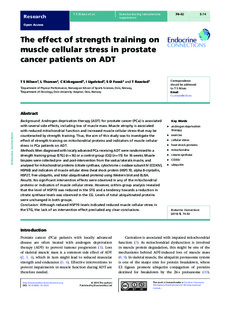| dc.contributor.author | Nilsen, Tormod S. | |
| dc.contributor.author | Thoresen, Lene | |
| dc.contributor.author | Kirkegaard, Camilla | |
| dc.contributor.author | Ugelstad, Ingrid | |
| dc.contributor.author | Fosså, Sophie Dorothea | |
| dc.contributor.author | Raastad, Truls | |
| dc.date.accessioned | 2017-01-19T12:41:01Z | |
| dc.date.available | 2017-01-19T12:41:01Z | |
| dc.date.issued | 2016 | |
| dc.identifier.citation | Endocrine Connections. 2016, 5, 74-82 | nb_NO |
| dc.identifier.uri | http://hdl.handle.net/11250/2427825 | |
| dc.description.abstract | Background: Androgen deprivation therapy (ADT) for prostate cancer (PCa) is associated with several side effects, including loss of muscle mass. Muscle atrophy is associated with reduced mitochondrial function and increased muscle cellular stress that may be counteracted by strength training. Thus, the aim of this study was to investigate the effect of strength training on mitochondrial proteins and indicators of muscle cellular stress in PCa patients on ADT. Methods: Men diagnosed with locally advanced PCa receiving ADT were randomised to a strength training group (STG) (n=16) or a control group (CG) (n=15) for 16 weeks. Muscle biopsies were collected pre- and post-intervention from the vastus lateralis muscle, and analysed for mitochondrial proteins (citrate synthase, cytochrome c oxidase subunit IV (COXIV), HSP60) and indicators of muscle cellular stress (heat shock protein (HSP) 70, alpha B-crystallin, HSP27, free ubiquitin, and total ubiquitinated proteins) using Western blot and ELISA. Results: No significant intervention effects were observed in any of the mitochondrial proteins or indicators of muscle cellular stress. However, within-group analysis revealed that the level of HSP70 was reduced in the STG and a tendency towards a reduction in citrate synthase levels was observed in the CG. Levels of total ubiquitinated proteins were unchanged in both groups. Conclusion: Although reduced HSP70 levels indicated reduced muscle cellular stress in the STG, the lack of an intervention effect precluded any clear conclusions. | nb_NO |
| dc.language.iso | eng | nb_NO |
| dc.publisher | Bioscientifica | nb_NO |
| dc.subject | androgen deprivation therapy | nb_NO |
| dc.subject | exercise | nb_NO |
| dc.subject | cellular stress | nb_NO |
| dc.subject | heat shock proteins | nb_NO |
| dc.subject | mitochondria | nb_NO |
| dc.subject | citrate synthase | nb_NO |
| dc.subject | COXIV | nb_NO |
| dc.subject | ubiquitin | nb_NO |
| dc.title | The effect of strength training on muscle cellular stress in prostate cancer patients on ADT | nb_NO |
| dc.type | Journal article | nb_NO |
| dc.type | Peer reviewed | nb_NO |
| dc.subject.nsi | VDP::Medisinske Fag: 700::Klinisk medisinske fag: 750::Endokrinologi: 774 | nb_NO |
| dc.source.journal | Endocrine Connections | nb_NO |
| dc.identifier.doi | 10.1530/EC-15-0120 | |
| dc.description.localcode | Seksjon for fysisk prestasjonsevne / Department of Physical Performance | nb_NO |
